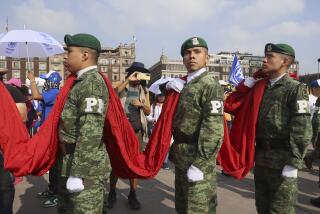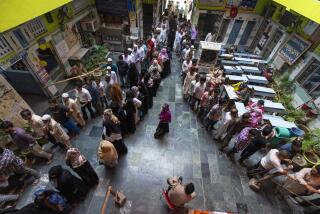Nigeria vote begins amid violence
- Share via
LAGOS, NIGERIA — Africa’s most populous country began voting Saturday in state and national elections, amid complaints that authorities have stopped dozens of opposition figures from running, doubts about voter registrations and an unresolved challenge to the list of presidential candidates.
The elections are aimed at completing the first transfer of power from one civilian leader to another since independence from Britain in 1960. And aside from the vote’s importance for Nigeria, analysts say the country’s size and influence means the success of its democracy will be reflected in other African countries.
From independence until elections eight years ago, Nigeria was under almost continuous military rule.
With reports of hundreds dead in preelection violence, questions remained about whether the elections would show any improvement over voting in 2003, in which European Union observers found widespread fraud.
“As the elections approach, the actions of the federal government and its agencies cast doubt on its commitment to multiparty democracy,” said a Human Rights Watch report released this month.
The elections are staggered over two weekends. Voting for state governors and parliaments was held Saturday, and elections for president and the national parliament are scheduled for next weekend.
But with just days to go before the presidential vote, the final field was still not clear. Nigeria’s Supreme Court will decide Monday whether Vice President Alhaji Atiku Abubakar may run on behalf of the opposition Action Congress party.
A decision in Abubakar’s favor would throw the election into chaos because the 61 million ballots printed do not include his name. The country’s election commission disqualified him last month because of corruption charges.
Abubakar says the charges are political. He fell out with President Olusegun Obasanjo when he successfully challenged the incumbent’s bid to change the constitution to allow him to seek a third term.
Obasanjo steps down next month as president of Nigeria’s estimated population of 140 million. The ruling People’s Democratic Party has nominated Umaru Yar Adua, a Muslim from the country’s north, as its candidate.
Twenty-four parties are fielding presidential candidates, but many will attract marginal support. The main contenders are considered to be Yar Adua; former military ruler Muhammadu Buhari of the All Nigeria People’s Party; and Abubakar, if he is allowed to run.
Clashes were reported Friday in Lagos, and seven police officers were killed overnight in two attacks on police stations in Port Harcourt, in the volatile, oil-rich Niger Delta.
The streets of Lagos, Nigeria’s economic capital, normally are clogged with slowmoving traffic, but they fell eerily quiet Saturday. Vehicles were banned and army roadblocks were in place amid tight security.
As voters lined up mid-morning at one polling station on Lagos’ Victoria Island, ballot papers and plastic voting boxes still had not arrived. Similar logistical problems were reported across the nation.
As the day grew hotter, a good-natured political debate broke out between two voters who had been waiting since early morning.
Prince Ndubueze, 28, a driver, said he feared the ruling party would hijack the election.
“I take offense at that,” said the next person in line, Yunusa Olaniyi, 30, a clothing trader.
Ndubueze complained that he had put up with four days of power cuts, and Olaniyi retorted that the problem was irrelevant to the election.
As their voices grew louder, Kadiri Turaki, 30, a lawyer farther back in line, said he feared that the elections would not be credible.
“I am not confident, but I have hope. I want to see the rule of law. I fear for the credibility of the system, based on past experience voting in 2003,” Turaki said.
Max van den Berg, chief of the EU’s 200 observers, cited problems such as a delayed start and reports of voting by those younger than the minimum age of 18. He also expressed concern that many of the thousands of observers from different parties did not get accreditation.
“In 2003, people were disappointed and frustrated because they had the feeling there was not a transparent election,” he said.
“There’s more competition” than in 2003, Van den Berg said. “But an interesting question is whether it’s competition of people moving from one party to another, rather than the true competition of different ideas for a better Nigeria.”
Human Rights Watch said the government had not only failed to prevent election violence, but that the integrity of the voter list was “in serious doubt.”
“While appearing unwilling or unable to address these grave threats to the integrity of the electoral process, Nigerian government agencies have shown considerable vigor in devising ways to prevent key opposition figures from standing in the elections,” the report said.
Analyst Robert Rotberg, writing in a recent Council on Foreign Relations report, said the elections would set the tone for Africa’s democratic development.
“If the democratic experiment in Nigeria fails,” he wrote, “the rest of Africa suffers and loses hope.”
More to Read
Sign up for Essential California
The most important California stories and recommendations in your inbox every morning.
You may occasionally receive promotional content from the Los Angeles Times.










